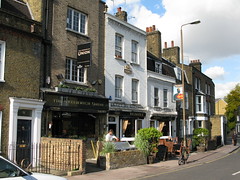THEY’VE just tarted up the Richard I, in Royal Hill, and I don’t like it. It’s not a disaster. They haven’t destroyed the place. But almost everything they have done is slightly wrong, and is clearly the work of people without any real feeling for a traditional pub.
The old-fashioned light fittings inside the main front windows have been replaced with large, bulbous globes of the kind you see in shopping-centre coffee chains. More of these things appear above both bars.
The saloon bar has been carpeted, in a carpet that would be attractive in a modern restaurant, but is not right here. The floor in the public bar, and all other wooden surfaces, have been varnished to within an inch of their lives. The yellowing old walls have been blandly repainted. Standard-issue café-bar type furniture has joined the pub tables and chairs. In a pub once known for its resistance to canned music, canned music now plays. An “Abba themed 60s and 70s party” is promised.
I know pubs are having an even worse time than the rest of us at the moment. Like small shops and post offices, they’re one of those bedrocks of England that increasingly aren’t there any more; even before the recession, it was reported that five a day were closing.
The Richard I is clearly trying to move away from the problematic pub category, into the territory of the café-bar. But it risks being an unhappy compromise, sacrificing the distinctive for the generic.
The fact is that pure-breed, slightly scruffy traditional pubs, of the kind the Richard I now half-isn’t, are now rarer and more interesting than café-bars. Many have either closed, or been converted to a small number of distinctly tired formulae.
There’s the youth drinking warehouse. The High Street chain pub, with its Sky Sports, predictable décor and accessories (job-lots of second-hand books on a shelf high up the wall, you know the sort of thing.) And the gastro-pub, where it’s the menu that’s often predictable (venison sausages and mash, sticky toffee pudding.)
The curse of the pub trade is partly the smoking ban, changing drinking habits and social patterns – the smoking ban, in particular, has done great damage and there is further New Labour nannying, such as price controls and happy-hour bans, to come. But perhaps the biggest problem is the rise, over the last twenty years, in pub corporate ownership.
Pubs used to be owned mainly by breweries, but in the early 1990s this was restricted. They are now owned mainly by a handful of giant pubcos, effectively property companies which brew no beer. Publicans allege that the pubcos, which are mostly heavily indebted, try to squeeze too much from their assets. And what’s undeniable is that, like the chaining of shops, the chaining of pubs has led to a loss of imagination and variety.
The Richard I may be one of the roughly 10,000 British pubs still owned by a brewery, but that doesn’t seem to have stopped it being affected by the trends in the rest of the sector. There’s a need for real action to save our pubs, unless we want another national institution to be destroyed.
Greenwich was, and indeed still is, a bit of a pub island: in a London of closed-down and tarted-up hostelries, relatively few of our pubs have shut or become formulaic. Let’s hope I’m overreacting to the Richard I; let’s hope it doesn’t herald further local disappearances of originality and character.

Andrew – you are quite right about Greenwich (and Blackheath) being something of pub islands and I don’t think you are over-reacting. Once one goes, there will be a ripple effect if the pattern in areas devoid of tourist and high-street shopping are anything to go by. Just look at Charlton; ten years ago there were thirteen locals and now just seven left. Three of those have been up-for-sale for some time with little apparent interest and danger of further closures. I popped into the Richard 1 and the Fox & Hounds (Greenwich Union) recently and was disappointed with both. My father would be turning in his grave if he could see them now.
Just as a PS to the “Abba-themed 60s and 70s night”: Abba didn’t actually exist in the 60s, it was only launched in 1973.